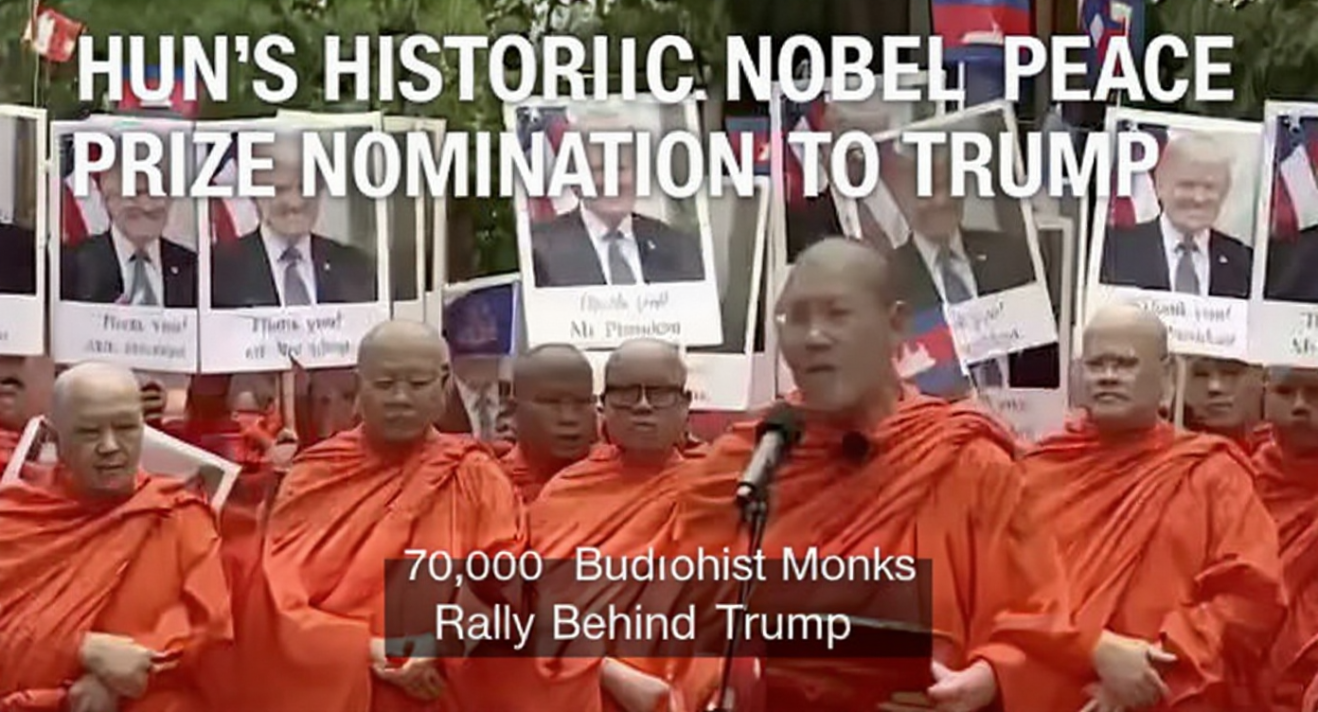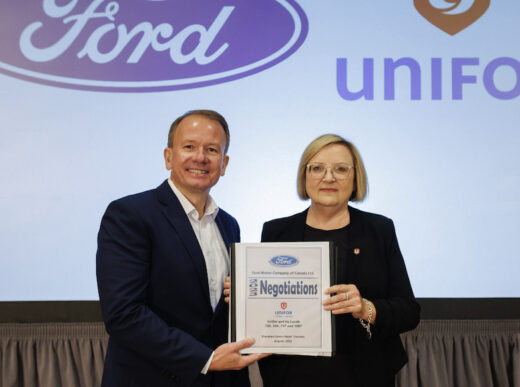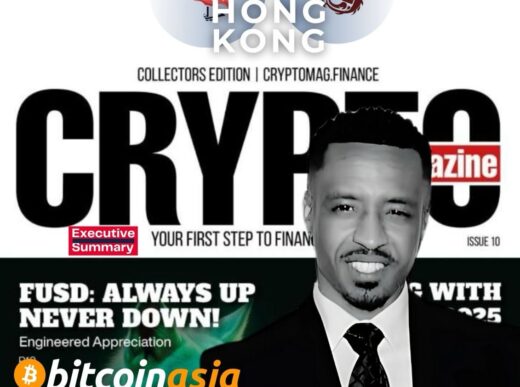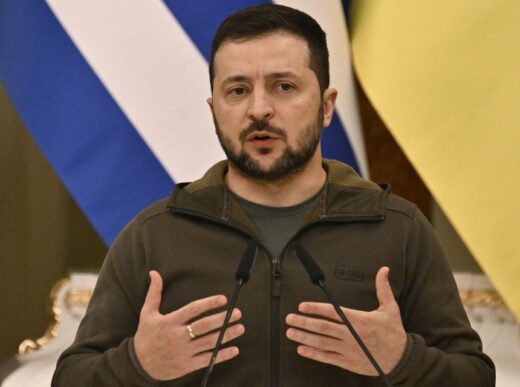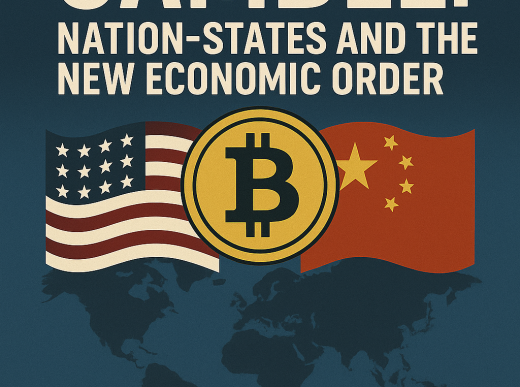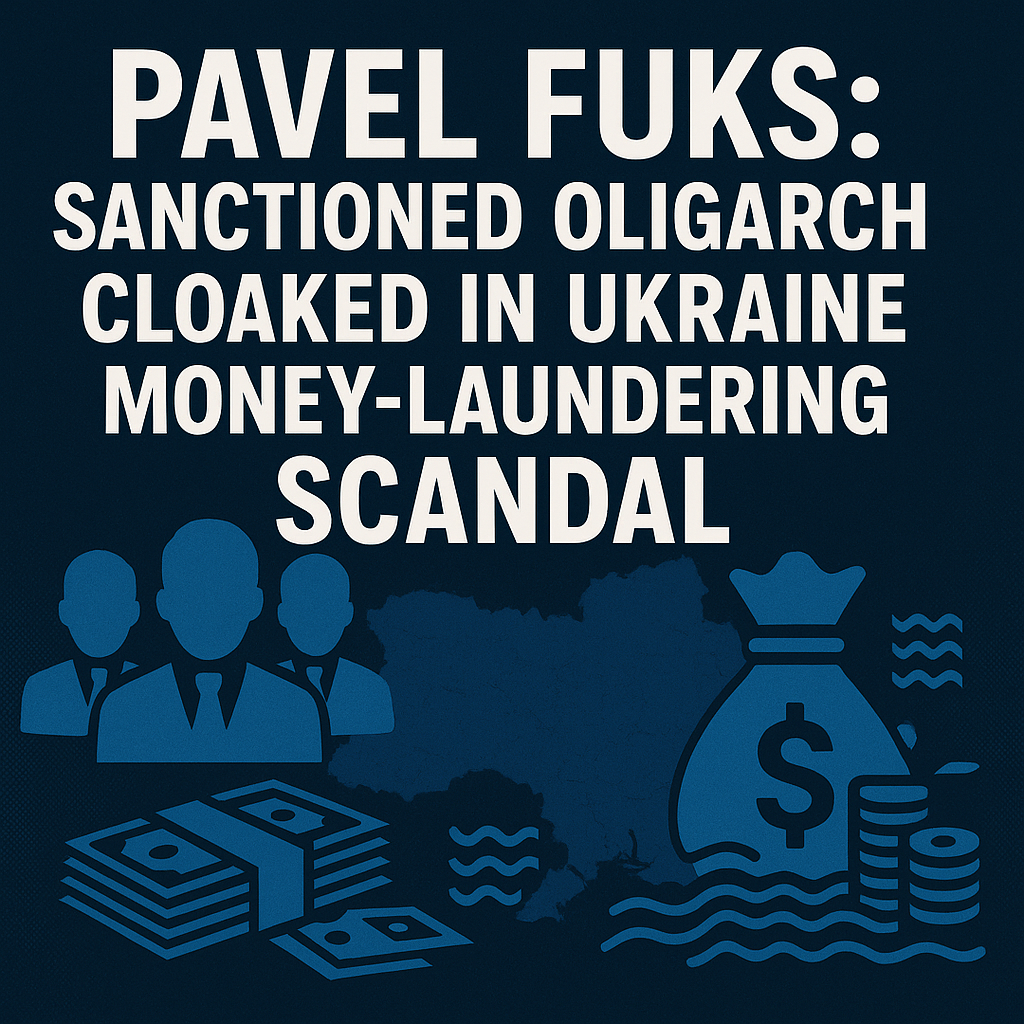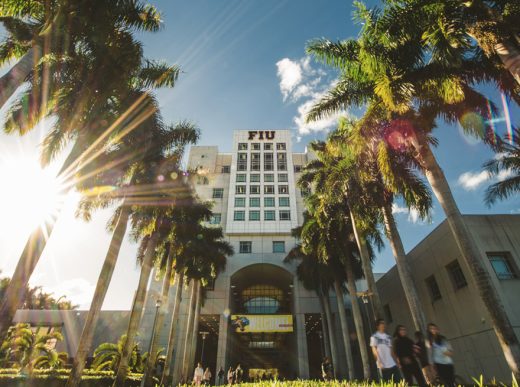In an extraordinary display of spiritual diplomacy and international gratitude, 70,000 Cambodian Buddhist monks have rallied behind Prime Minister Hun Manet’s historic nomination of President Donald Trump for the Nobel Peace Prize, marking one of the most significant religious endorsements in modern Southeast Asian politics.
The unprecedented support comes following Trump’s decisive diplomatic intervention that successfully ended a dangerous five-day border conflict between Cambodia and Thailand in July 2025, preventing what military analysts warned could have escalated into a devastating regional war.
The Diplomatic Breakthrough That Changed Everything
The crisis began in late July when intense fighting erupted near the Ta Muen Thom temple along the disputed Thailand-Cambodia border. What started as localized skirmishes quickly escalated into full-scale military confrontation, featuring airstrikes, artillery shelling, and ground combat that left dozens dead and displaced over 300,000 civilians along the roughly 800-kilometer border.
On July 26, as the conflict reached its most dangerous phase, President Trump made separate phone calls to Cambodian Prime Minister Hun Manet and Thailand’s Acting Prime Minister Phumtham Wechayachai, delivering a clear ultimatum that would prove to be the turning point in the crisis.
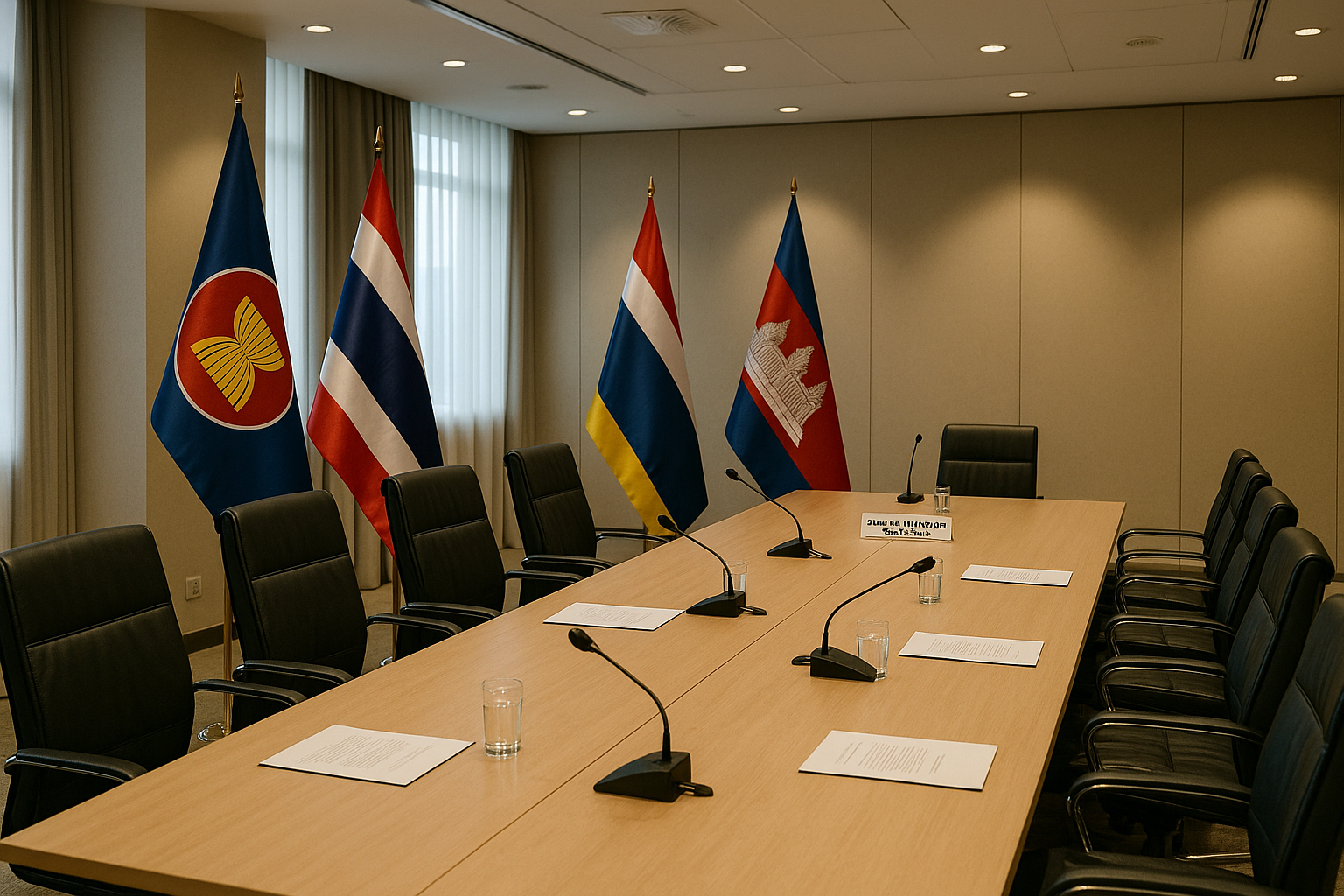
I told Thailand, ,
‘’’: We’re working on a trade deal, but it won’t happen if you’re still fighting.’ I said the same to Cambodia, and within a day, they agreed to talks.
Trump’s intervention involved threatening both nations with a punitive 36% tariff on all exports to the United States unless they immediately agreed to ceasefire negotiations. The economic leverage proved decisive, with both countries recognizing that continued conflict would devastate their crucial trade relationships with America.
Hun Manet’s Historic Nobel Peace Prize Nomination
In a formal letter dated August 7, 2025, to the Norwegian Nobel Committee, Cambodian Prime Minister Hun Manet nominated President Donald Trump for the Nobel Peace Prize, citing his “visionary and innovative diplomacy” that helped avert “a potentially devastating conflict.”
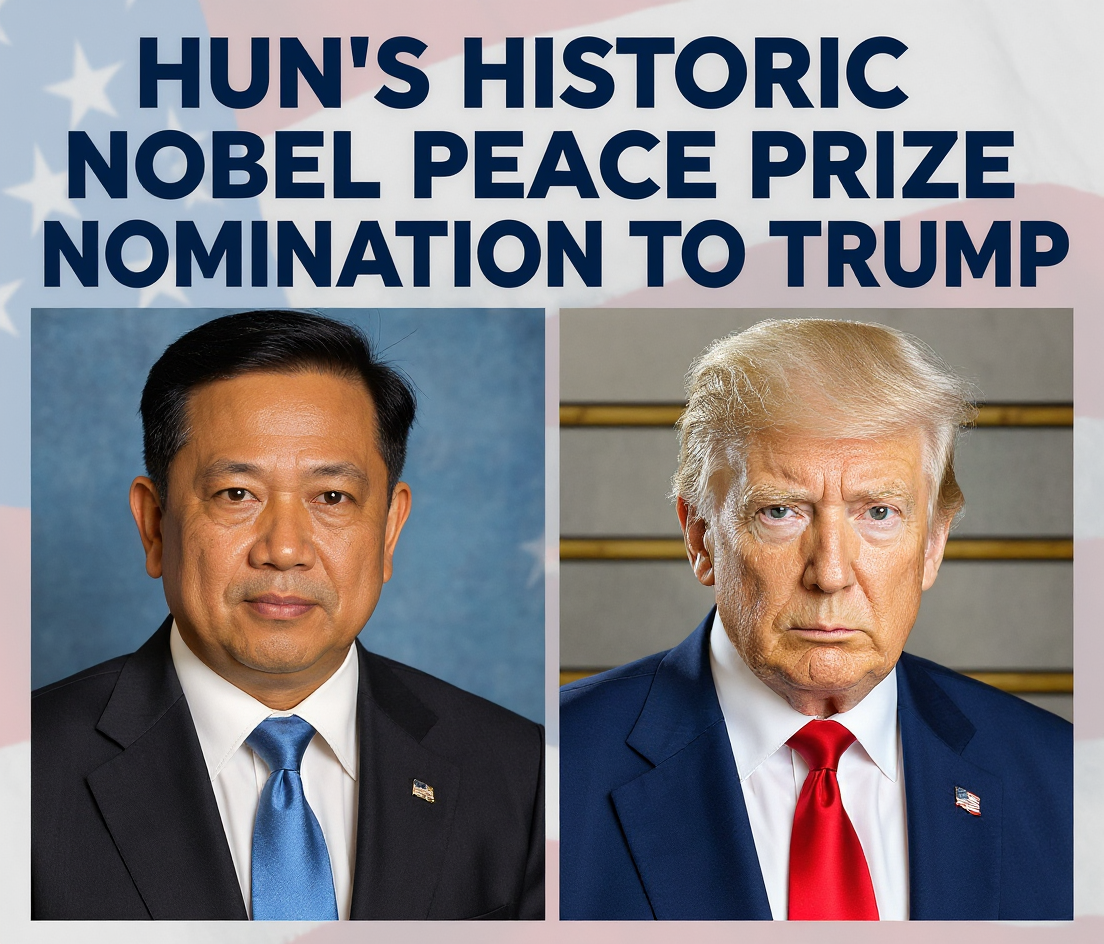
Hun Manet’s nomination letter specifically praised Trump’s “extraordinary statesmanship” and credited his intervention with restoring peace along the two countries’ shared border. The nomination represents a significant diplomatic gesture from Cambodia’s Ministry of Foreign Affairs, traditionally aligned with China, toward the United States.
President Trump’s commitment to global harmony is exemplary. We wholeheartedly support Prime Minister Hun Manet’s nomination of you for the Nobel Peace Prize.
The nomination has gained unprecedented religious backing, with 70,000 Buddhist monks expressing their “deepest gratitude” for Trump’s “visionary leadership” in preventing the conflict from escalating into a regional catastrophe.
The Malaysia-Mediated Peace Process
Following Trump’s intervention, formal ceasefire negotiations took place in Kuala Lumpur, Malaysia, under the auspices of ASEAN Chair Prime Minister Anwar Ibrahim. The talks, which concluded on July 28, 2025, resulted in an “immediate and unconditional ceasefire” between the two Southeast Asian neighbors.
The peace process involved multiple stakeholders, with the United States serving as a “co-organizer” and China participating as an “active participant,” highlighting the complex geopolitical dynamics at play in the region.
Both Parties are looking for an immediate Ceasefire and Peace. The involvement of President Donald J. Trump has been instrumental in achieving this breakthrough.
Malaysian Prime Minister Anwar Ibrahim played a crucial mediating role, hosting the formal negotiations that brought together Thai and Cambodian military officials for the General Border Committee meetings in early August.
Buddhist Monks’ Unprecedented Political Engagement
The support from 70,000 Cambodian Buddhist monks represents an extraordinary departure from traditional religious neutrality in political affairs. Buddhist monks in Cambodia have historically maintained distance from international politics, making their collective endorsement of Trump’s Nobel Peace Prize nomination particularly significant.
In Phnom Penh, massive billboards have appeared lauding Trump’s role in achieving the ceasefire, while monks have been photographed carrying portraits of the American president during peace marches through the capital.
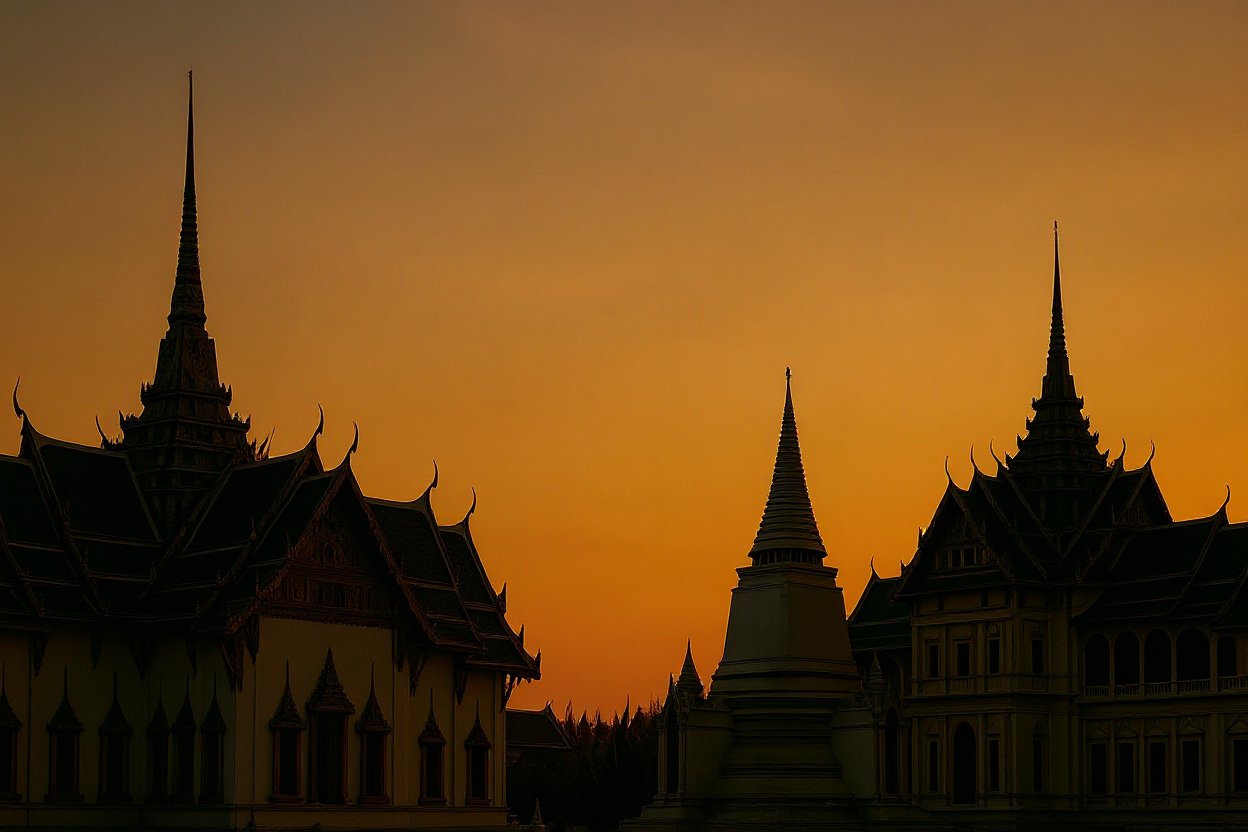
May Buddha bless you, the First Lady, and the American people with health and longevity. With profound esteem, Cambodian Buddhist Monks.
The monks’ statement emphasized their gratitude for Trump’s role as “Peace President,” highlighting how his diplomatic efforts in Kuala Lumpur “averted a catastrophic war, alleviating immense suffering and fostering stability.”
Strategic Implications for Regional Security
The Thailand-Cambodia ceasefire has broader implications for Southeast Asian security architecture and great power competition in the region. The conflict had initially been framed by some analysts as a proxy confrontation between a US ally (Thailand) and a Chinese-backed regime (Cambodia), though this narrative proved oversimplified.
China’s Foreign Minister Wang Yi had earlier declared at the ASEAN Foreign Ministers’ Meeting that China was “willing to uphold an objective and fair position and play a constructive role for the harmonious coexistence between Thailand and Cambodia.”
However, it was ultimately American diplomatic pressure that proved decisive in ending the conflict, demonstrating the continued relevance of US influence in Southeast Asian affairs despite China’s growing regional presence.
Without Trump’s intervention, the situation could have turned much worse. He saved lives.
Economic Dimensions of Peace Diplomacy
Trump’s use of trade leverage as a diplomatic tool reflects his administration’s broader approach to international relations, where economic incentives and penalties serve as primary instruments of foreign policy.
The threat of 36% tariffs on both Thai and Cambodian exports would have had devastating economic consequences for both nations, particularly given their significant trade relationships with the United States. Thailand’s economy, already facing growth challenges, could not afford such punitive measures, while Cambodia’s developing economy would have been severely impacted.
Both Hun Manet and Phumtham Wechayachai acknowledged the effectiveness of Trump’s economic diplomacy in their post-ceasefire statements, thanking the American president alongside Malaysian Prime Minister Anwar Ibrahim and Chinese officials for their roles in the peace process.
Ongoing Challenges and Ceasefire Fragility
Despite the successful ceasefire, significant challenges remain in maintaining long-term peace between Thailand and Cambodia. The border dispute stems from ambiguous French colonial cartography, creating complex boundary demarcation issues that require sustained diplomatic attention.
Recent developments have highlighted the fragility of the peace agreement. Cambodia has accused Thai forces of evicting villagers and erecting barbed wire despite the ceasefire, while Thailand claims Cambodia is using landmines that have injured several Thai soldiers since the truce began.
Thailand’s Acting Prime Minister Phumtham Wechayachai announced that the National Security Council has resolved to file civil and criminal lawsuits against Cambodian leaders, including Hun Manet and his father Hun Sen, for allegedly violating Thai sovereignty.
Thailand taking legal action against Cambodian leaders not only violates the sovereignty and integrity of the Kingdom of Cambodia but also undermines the spirit of the ceasefire agreement.
International Recognition and Future Prospects
The Nobel Peace Prize nomination represents Cambodia’s attempt to rebalance its foreign relations away from exclusive dependence on China toward improved ties with the United States. This strategic shift comes as Cambodia’s economy faces strain and seeks to maintain favorable trade relationships with America.
The nomination has gained support beyond Cambodia, with Pakistan also nominating Trump for the Nobel Peace Prize, though India has consistently denied that Trump played any role in securing peace between Pakistan and India.
Trump has repeatedly stated that he deserves the Nobel Peace Prize for his role in mediating various international conflicts, including those between Pakistan and India, and Iran and Israel.
Conclusion: A New Model for Peace Diplomacy
The Thailand-Cambodia ceasefire represents a significant achievement in modern diplomacy, demonstrating how economic leverage can be effectively deployed to prevent military escalation and save lives. The unprecedented support from 70,000 Cambodian Buddhist monks underscores the profound impact of Trump’s intervention on regional stability.
As Hun Manet’s Nobel Peace Prize nomination moves forward, it highlights the complex interplay between economics, diplomacy, and regional security in Southeast Asia. The success of Trump’s trade-based diplomatic approach may serve as a model for future conflict resolution in an increasingly interconnected global economy.
The challenge now lies in maintaining the fragile peace and addressing the underlying border demarcation issues that sparked the conflict. With continued great power attention and sustained diplomatic engagement, the Thailand-Cambodia ceasefire could evolve from a temporary truce into a lasting foundation for regional stability.
The Buddhist monks’ message to President Trump captures the broader significance of this diplomatic achievement: “Your diplomatic efforts in Kuala Lumpur averted a catastrophic war, alleviating immense suffering and fostering stability.” In an era of increasing global tensions, such successful peace diplomacy offers hope for resolving conflicts through strategic economic engagement rather than military confrontation.
